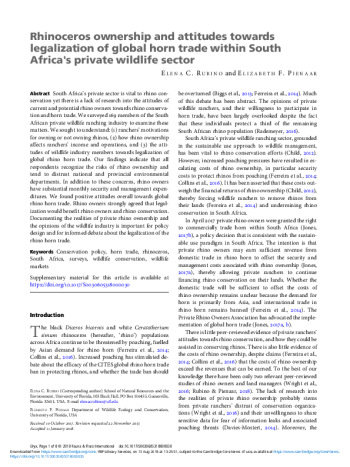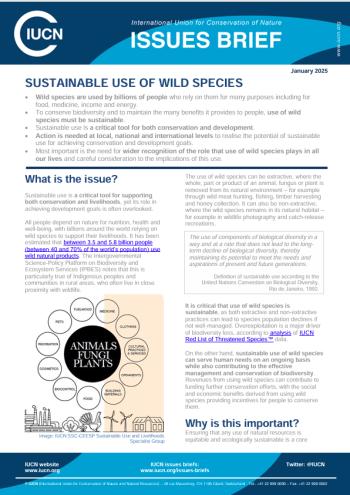
Rhinoceros ownership and attitudes towards legalization of global horn trade within South Africa's private wildlife sector
South Africa’s private sector is vital to rhino conservation yet there is a lack of research into the attitudes of current and potential rhino owners towards rhino conservation and horn trade. We surveyed members of the South African private wildlife ranching industry to examine these matters...
Our findings indicate that all respondents recognize the risks of rhino ownership and tend to distrust national and provincial environmental departments. In addition to these concerns, rhino owners
have substantial monthly security and management expenditures. We found positive attitudes overall towards global rhino horn trade.
Rubino, E., & Pienaar, E. (2018). Rhinoceros ownership and attitudes towards legalization of global horn trade within South Africa's private wildlife sector. Oryx, 54(2), 244-251. doi:10.1017/S0030605318000030
-

Prof Elizabeth Pienaar
Research Fellow (2019-2021) -
Elena Rubino
We support the free flow of information. Please share:
Form coming soon
Related Content
-

-

Review of African Social and Economic Development Volume 1
ByIbrahim Bàbátúndé Anobaarrow_forward2024 -

Economic Analysis: Climate Change and Wildlife Utilization on Private Land
ByJackson OtienoEdwin Muchapondwaarrow_forward2015
Get updates by email
Through impactful research, stakeholder engagement, and professional development, AWEI is supporting the wildlife economy across Africa. Please subscribe for occasional updates on our work and forthcoming events.
Sign up for a quarterly dose of AWEI insights
In a complex and changing world, AWEI generates strategic ideas, conducts independent analysis on wildlife economies, and collaborates with global scholar-practitioners to provide training and expertise for biodiversity conservation, climate resilience, and inclusive economic opportunities in Africa.
